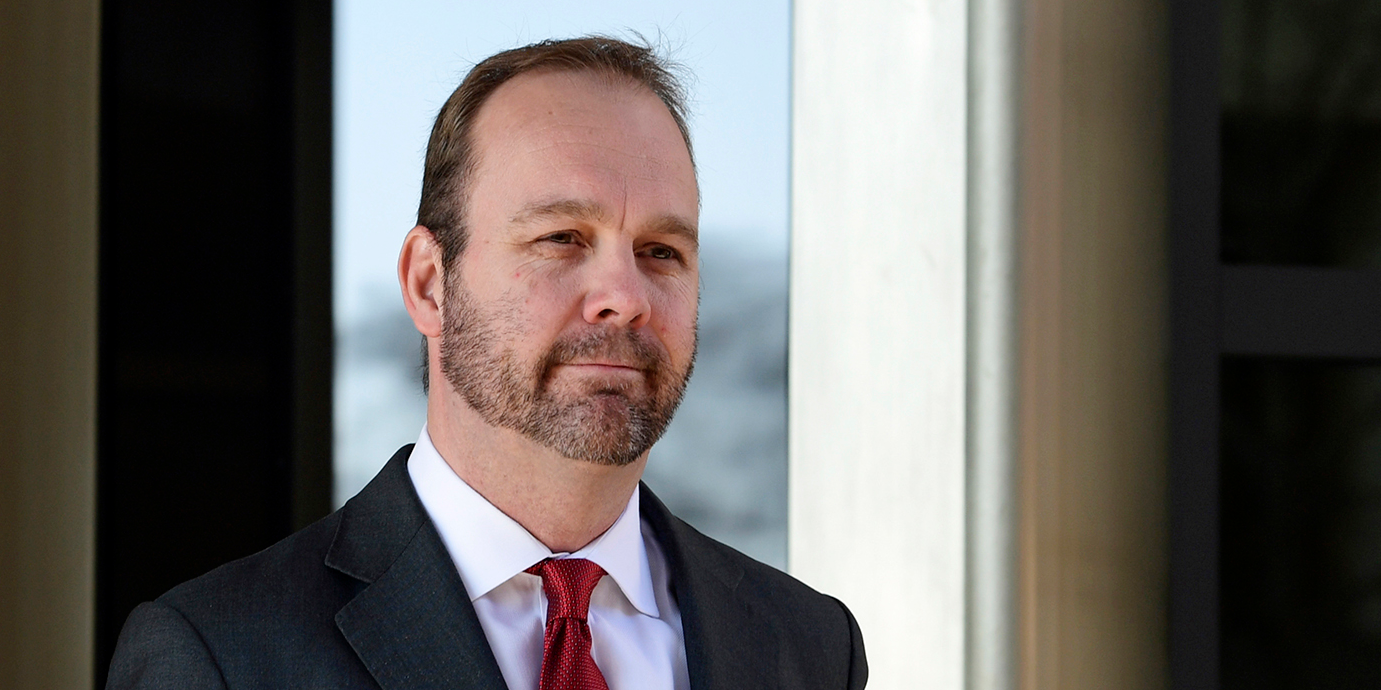- New court documents filed Tuesday night directly connect Rick Gates, a former Trump campaign deputy chairman, to an operative with ties to Russia’s military intelligence unit.
- Gates was aware of the operative’s links to Russian intelligence, the documents say.
- The identity of the person is unclear, but the description bears similarities to Konstantin Kilimnik, a longtime associate of Gates and Paul Manafort, the former Trump campaign chairman.
- Manafort has pleaded not guilty to dozens of charges related to tax and bank fraud, money laundering, and conspiracy against the US.
- Gates pleaded guilty last month and is now cooperating with Robert Mueller, the special counsel leading the Russia investigation.
Rick Gates, the former deputy chairman of Donald Trump’s presidential campaign, was aware that he was communicating with someone linked to Russian intelligence before the 2016 US election, new court filings say.
The special counsel Robert Mueller’s office disclosed the information late Tuesday in documents related to the sentencing of Alex van der Zwaan, a Dutch lawyer.
Van der Zwaan pleaded guilty last month to one count of making false statements to investigators in the Russia investigation, which is examining the extent of Russia’s interference in the 2016 election and whether members of the Trump campaign colluded with Moscow to sway the race in Trump’s favor.
In a separate memorandum filed Tuesday evening, van der Zwaan requested a lenient sentence. He’s asking the judge whether he can pay an “appropriate fine” rather than go to jail, according to the document.
Mueller's office did not make a judgment on what van der Zwaan's sentence should be, but it pointed out his experience as a longtime lawyer and said he lied after Gates and Paul Manafort, the former Trump campaign chairman, were indicted in the Russia investigation.
Van der Zwaan is accused of lying to investigators about why he did not provide Mueller's office with a September 2016 email between him and another person referred to as "Person A" in the February charging document.
The court filing says van der Zwaan not only spoke with both Gates and the unnamed person about a report on a controversial Ukrainian politician's trial, but also destroyed evidence Mueller's office was seeking, including the September 2016 email.
Tuesday's filing from Mueller's office says it was "pertinent to the investigation" that "Gates and Person A were directly communicating in September and October 2016."
It added that federal investigators had assessed that Person A is directly tied to Russian intelligence "and had such ties in 2016."
The filing continued: "During his first interview with the Special Counsel's Office, van der Zwaan admitted that he knew of that connection, stating that Gates told him Person A was a former Russian Intelligence Officer with the GRU," Russia's military intelligence unit.
Jeffrey Cramer, a former federal prosecutor who spent 12 years at the Department of Justice, cautioned against painting the identity of Person A with too broad a brush. But he added that it was "safe to say" that "Mueller is not prone to exaggeration, so they probably have this tightly tied down."
"The relevant questions now - beyond how it may impact the van der Zwaan sentencing - are whether Gates related this connection to anyone else relevant in the Trump orbit, did that person lie to OSC about the issue, did the Trump campaign get anything of value from the Russians, and similar inquiries," he said.
Who is 'Person A'?

The identity of Person A is unclear.
But the documents say the person is an associate of Manafort's, and the description bears similarities to Konstantin Kilimnik, a Russian-Ukrainian operative who has long been suspected to have ties to Russian intelligence.
Mueller's office in December accused Manafort of working with Kilimnik to help ghostwrite an op-ed article last year about his consulting work in Ukraine. That article landed Manafort in hot water with prosecutors and the judge presiding over the federal criminal case against him.
The op-ed article sought to positively portray the Ukrainian government's work when it was under the leadership of Viktor Yanukovych, the former Ukrainian president and pro-Russia strongman whom Manafort is widely credited with helping win Ukraine's election in 2010.
Oleg Voloshyn, the spokesman for Ukraine's ministry of foreign affairs under Yanukovych, told Bloomberg last year that he wrote the op-ed article and sent a draft to Kilimnik in early December. He added that Kilimnik forwarded it to Manafort, who "advised me to add that the Yanukovych government also worked actively with the US on nuclear disarmament and with NATO."
The op-ed article was submitted to the Kyiv Post, an English-language Ukrainian media outlet, which declined to publish it. Brian Bonner, the editor, told Bloomberg it was "highly suspicious" and "blatantly pro-Manafort."
Last October, The Atlantic also published several emails that appeared to show Manafort using his elevated role in the Trump campaign to work with Kilimnik in resolving a financial dispute with the Russian oligarch Oleg Deripaska.
Mueller's latest court filing - and more that come out of van der Zwaan's case - could help shed light on whether Person A was Kilimnik, and whether Manafort, as one of the highest-ranking members of the Trump campaign, knew that Person A was tied to Russian intelligence.
Manafort has pleaded not guilty to dozens of charges brought against him, including tax and bank fraud, money laundering, and conspiracy against the US.
Gates pleaded guilty last month to conspiracy and making false statements to the FBI. He is cooperating with Mueller's office.

